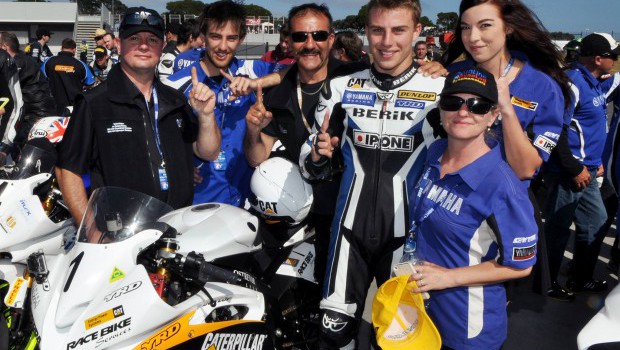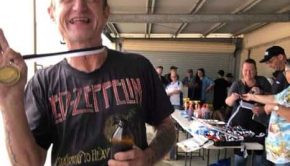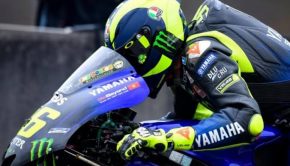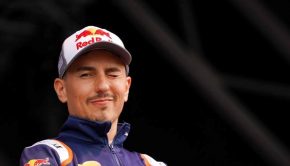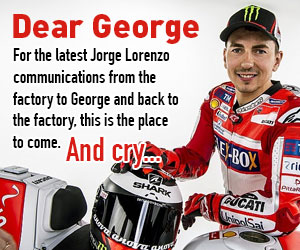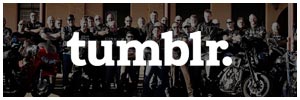DANIEL FALZON – THE WAY OF THE CHAMPION
Daniel Falzon is 19 years old and fast. Very fast.
He is fast enough to have become the 2012 Superstock champion.
He is fast enough to have become the 2013 Supersport champion.
He is fast enough to have been offered a wildcard ride in MotoGP’s Moto2 class last year.
And he is fast enough to become one of the greatest riders this country has ever seen.

The world’s fastest caterpillar.
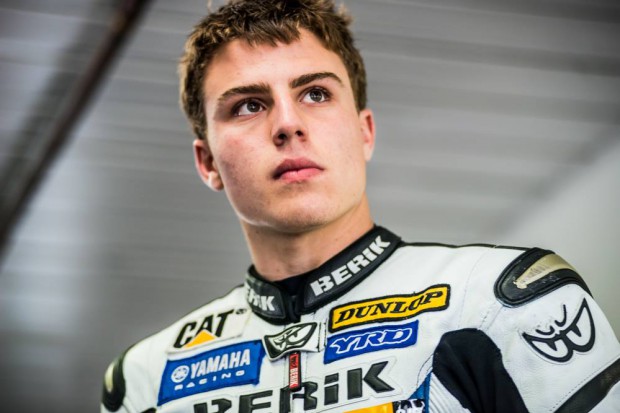
“There’s a spider up there.”
But because that is the case, he is also fast enough to upset a lot of people.
Most especially those who are not as fast as he is.
And you know how people who are upset carry on – especially at this level of motorcycle racing where the riders are young and usually accompanied by their oldies, some of whom can and do behave like emotionally unstable soccer parents when their fast kid is being beaten by a faster kid.
Unable to come to terms with the fact that Daniel is faster than everyone else in the paddock because he twists that black thing on the right handlebar for longer (which is kinda why he is the champion), and rather than examining why they are not as fast and how they could be faster, they subject Daniel to unfounded and hysterical aspersions.
Like the time Daniel was accused of cheating, as was reported in Trevor Hedge’s excellent MCNews piece following the second Supersport race at the 2013 ASBK round at Phillip Island.

And awaaaaay he goes.
Here is the verbatim exchange between Trevor and the self-aggrieved party:
Trevor Hedge: “You look to be struggling for speed compared to Falzon down the chute?”
Self-Aggrieved Party: “Yeah, it’s been a rocketship last year and it seems as though nothing has changed, hopefully somebody will do something about it soon.”
Really?
Let us consider that statement for a second.
The naked assertion is that Daniel’s bike is somehow modified and therefore Daniel is cheating and has been cheating and that someone had better get their shit together and stop him cheating.
So rather than examine one’s own race-craft and set-up to see if there are any deficiencies one could address, one chooses to make unfounded allegations.
Classy, huh?

Jon warms the tyre warmers on his brother’s bike. The secret to Daniel’s success is no longer a secret.
It’s the kind of accusation you expect to hear each time Marquez, or Melandri, or Dunlop, or Bugden, or Curtain, or Waters, or Herfross smashes his rivals – except you don’t. And you won’t, for obvious reasons. Because at the top level of the sport, or any sport, making false allegations against competitors carry serious repercussions for the one making the claims.
Oddly, all that happened here was that the squeaky wheels got some grease.
Daniel’s team was required to strip the engine and provide chunks of it to the scrutineers for measuring, weighing and quantifying. This is no small expense for any team at this level.
Of course, there was nothing at all out of place.
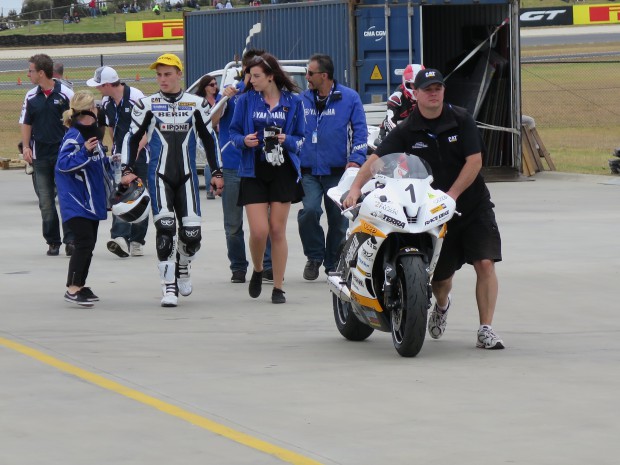
The walk of the winner back from post-race scrutineering at this year’s PI Supers. The bloke pushing the bike is team mechanic, Anthony Hamilton. That is his happy face.
The team shrugged, put it all behind them, and moved on.
The simple fact of the matter, which rises above the bleating like the plain truth that it actually is, is that Daniel out-raced the other bloke. That is why Daniel became the 2013 Supersport champion.
He’s just faster, and yes, it really is that simple.
But the reasons why Daniel Falzon is so fast is what interested me, and has interested me since I first heard of him back in 2012 when he was busily winning the Australian Superstock title.
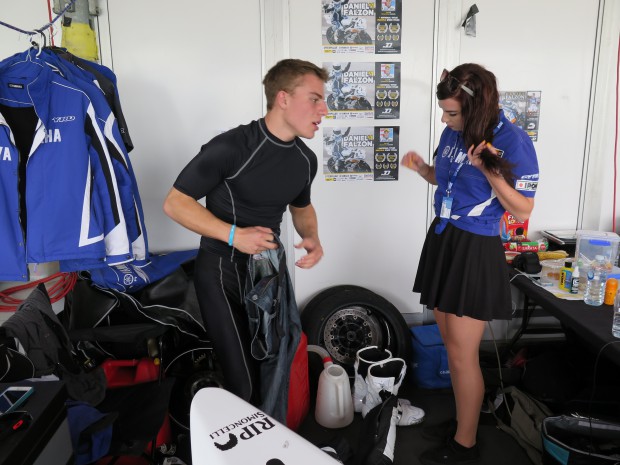
Girlfriends get to do all the fun stuff in the pits, like critique the boyfriend’s choice of underpants…

…listen to the boyfriend’s dad’s jokes…
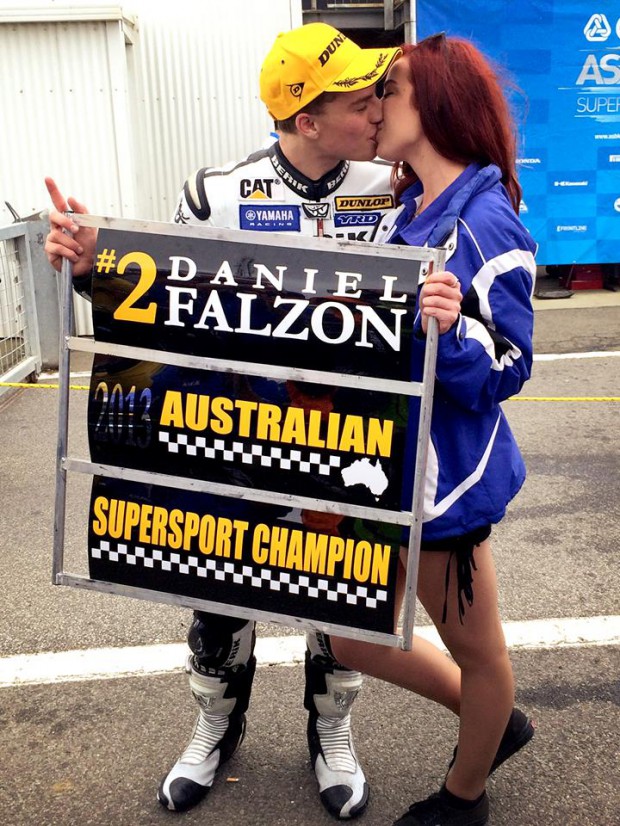
…and check him for Racer’s Breath.
So I went to see what I could learn at Phillip Island during this year’s round of the WSBK, when Daniel was racing in the opening round of the Australian Supersport championship.
Which he won, by the way.
I arrived in the paddock just as he was leaving post-race scrutineering, and after congratulating him on his win, I followed him back to his pit and promptly went to talk with his parents.
If anyone would know why Daniel was so fast, it would have to be his mum, Kylie and his dad, Joe.
The three of us sat down just inside the pit awning, and as the clouds gathered and the rain began to spit down in a typical Phillip Island benediction, I started to understand why Daniel Falzon is so fast.
Daniel, who makes his home in Adelaide, started racing at the age of 13 with the Motorcycle Road Race Development Association (MRRDA), and apart from roosting his father with sand off the back wheel of his tiny two-stroke JR80 Suzuki at the age of nine, has never raced or spent time on the dirt.

Jon uploads the latest data for the CIA to ponder.

Fruit Loops, mum’s sangas and iPhones. All the secrets are out.

Kylie – best race-mum, ever.
And thus is dispelled the oft-stated belief that you first have to race dirt to be fast on the track.
“I don’t have a lot of dirt experience,” Daniel grinned when I asked him about it. “As many have seen on the Ultimate Rider. I actually started on dirt bikes when I was nine and I only rode them for a couple of years just for fun. Never took it seriously. Never raced. Pretty much stopped for a little bit and then went to road bikes. It’s a bit of a touchy subject with me. People say you have to have raced dirt bikes. I’ve been told by many people your ability will be limited by not riding dirt bikes; and you won’t get the feeling of sliding a bike around a corner. I completely disagree. I don’t know if you just watched that race, but it was going pretty sideways around those corners and it doesn’t bother me. I just think you need time and practice. Practice on anything is going to make you better.”
Clearly, the young bloke has had lots of practice.
But there was more to it than just that.
“You could just tell he had it,” Joe grinned as he recalled those days.
Daniel turned professional at 14, after securing the MRRDA junior championship and at 15, he won the Hartwell and Victorian titles astride a GP-class 125.
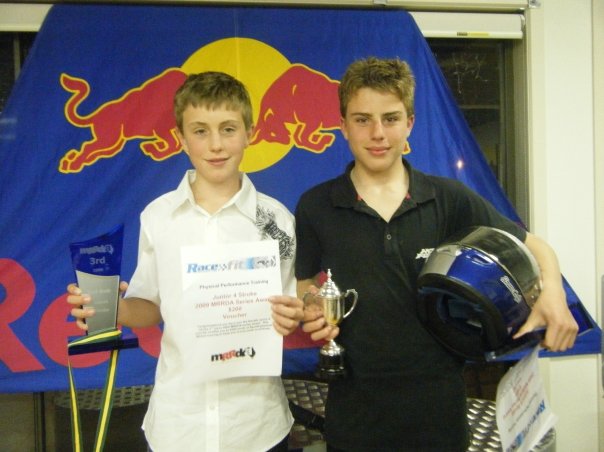
The MRRDA thinks very highly of the children.
The way forward was clear, and the learning curve for both Daniel and his parents was steep. And though the path was certain, its negotiation was not.
At 16, an age when “He could hardly reach the ground” on his new 600, Daniel came third behind Kevin Curtain and Rick Olsen.
“We didn’t even know he could ride 600s,” Joe laughed. “I didn’t even know what tyre pressures to put in them.”
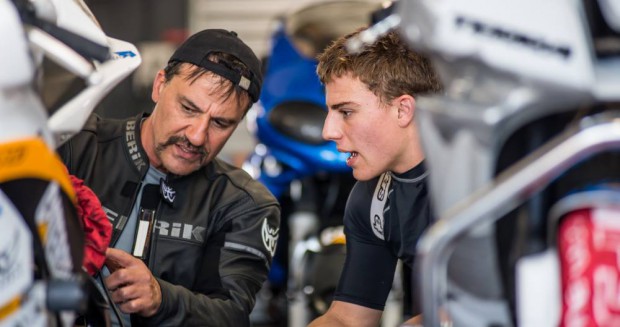
“What happened here?”
“Speed, Dad. Speed happened there.”
When they were racing up in Queensland, Daniel’s race bike was wedged into their motel room and race-prepped by his mum and dad. Daniel refers to it as his “Mum-built race bike.”
Throughout this entire time, Joe and Kylie both have nothing but praise for the support they received (and continue to receive) from Yamaha, both in terms of the factory’s rider development program as well as supplying parts and making those parts affordable.
And it was around this time that Daniel’s consistent performances and lap-times attracted the attention of Phil Canning, the Managing Director of Energy Power Systems – Caterpillar Engine Dealer for Australia and PNG, and a bona fide bike nut. This attention turned into substantial sponsorship and Daniel’s Yamaha duly sprouted the internationally recognised Caterpillar logo on its flanks.

Phil Canning and Daniel rub front tyres. It’s a man thing.
The serious championships of 2012 and 2013 followed.
And here we were in 2014, fresh off a win and getting slightly damp. Behind us, the rest of his team moved about the pit garage with unhurried, professional and clearly much-practiced precision. Daniel’s older brother Jon, a high-end mechanical engineer and some kind of computer sorcerer-savant, addressed his iPhone and laptop.
The team mechanic, Anthony Hamilton, was engaged in one of those million tasks team mechanics engage in during a race weekend, all of which are a mystery to me and none of which I wanted to ask him about in case he stabbed me with a screwdriver. The day’s racing was done, but the mechanic’s work is never over.
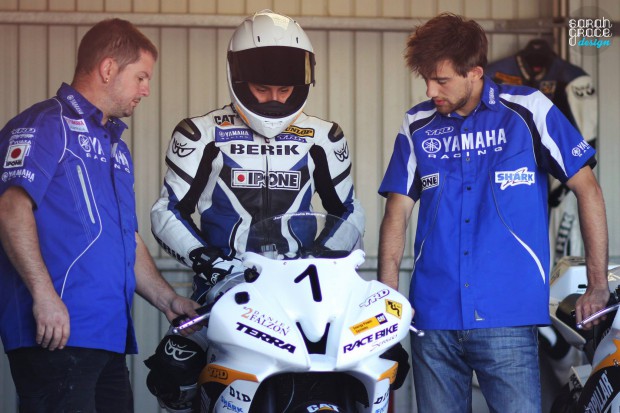
The mechanic, the rider and the engineer. And that strange warning light (not pictured).
Sarah, Daniel’s strikingly pretty girlfriend, was doing what racers’ girlfriend’s do at these things; she helped him out of his leathers, provided him with some food, and moved about the garage with grace and good humour.
Daniel spent some time talking to fans out the front of the garage, sitting their kids on his bikes and posing for pictures. He smiled, was engaging, genuine and happy to chat to people who came up to shake his hand. It was obvious that this was a professional at work, surrounded and supported by people who loved him and believed in him.
In terms of racing, the team is a perfect storm.
Both Kylie and Joe are supportive, passionate and enthusiastic. There is not a hint of weirdness, obsession, resentment, or entitlement about them.
They know Daniel is good and they know Daniel is quick and they know that he is in a good place right now.
But do they know why he is so fast?
I had to ask.
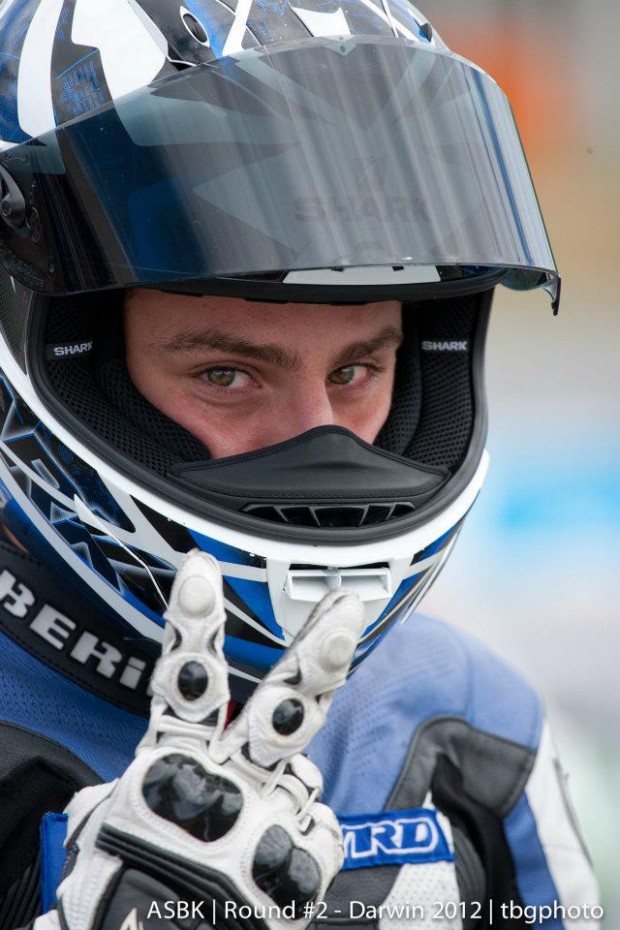
Two championships. And counting…
“All bullshit aside, why is Daniel so fast?”
Joe thought about this for a second, then he grinned.
“It’s because he listens,” he said. “He’s an educated, intelligent kid.”
“He has never rested on his laurels,” Kylie added. “He is always looking for ways to get faster.”
They explained that Daniel has always been a bit of trainspotter when it comes to motorcycle racing. He truly loves the sport, follows it religiously, and can tell you who won the fourth race of the British Superbike series in 2011.
I didn’t ask him that question because I would have no idea if he was right or not, but I did pick around inside his head for a bit when I finished chatting to his oldies. His answers were as surprising and unique as Daniel is himself…

Over the top at the Island.
Where do you like racing the most?
“My favourite track is Hidden Valley. I’m going to go against the grain of people saying Phillip Island. It’s not only the track that I’ve gelled with, it’s the atmosphere. And I’ve always had a confidence at that track; since 2011 when we went there for the Superstock 600 and really stepped up our game. I knew then that we were in the championship to win it after finishing second in the round after running fourth in the series. And the next year we went there and clean-swept it with two lap records. Also the supporters up there have been absolutely great and local bike shops have always helped our team when we’ve needed parts.”
I understand you’re also a university student. What are you doing in university?
“I’m doing a degree in health sciences majoring in paramedics. And if my grades are good this year, I’ll be a permanent student in paramedics.”
Having hugged you in a fit of drunken man-love the other night in Cowes, it is obvious you train. There is nothing jelly-like about you at all. You obviously lift.
“I do. This season has been a bit difficult because I’ve had a broken leg. I do predominantly cardio and I like getting on the treadmill and the pushbike. In the summer I’m in the pool a lot. And that’s my main off-season training, in the pool. And I also do some lightweight resistance training.”
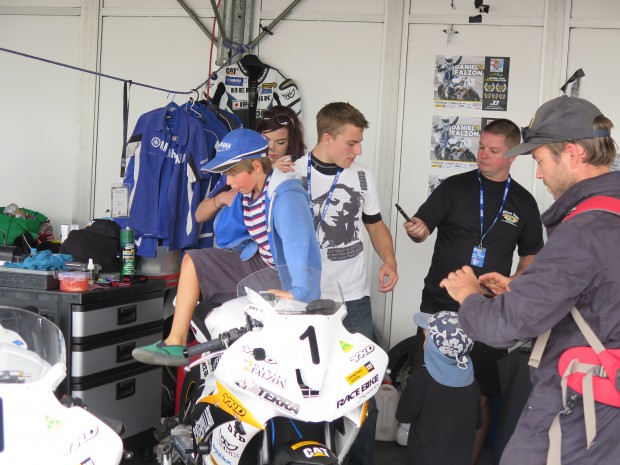
“Here. Sign the kid.”
Apart from Spiderman, who is your motorcycle racing hero?
“I started in 2007, so it could be no other than Casey. Although I think that Valentino has been the best for the sport.”
So what about this Marquez fellow that everyone is so excited about?
“I think the new generation of racers coming through the ranks now are gonna be a hell of a lot faster than the older generation. It’s so hard to get into the world championship these days. People are putting their life savings on the line and so they’re trying so much harder in the races. They’re putting so much more training into their game. If Marquez manages to stay on, which is a big ‘if’, he’ll win this championship with ease”

Another secret to his success can be seen here…
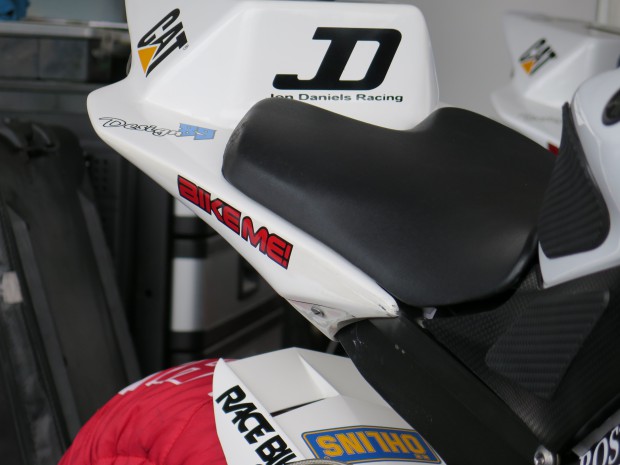
Worth at least a second a lap.
What racetrack do you really want to race at?
I’ve always wanted to race in Valencia. Valencia’s the dream. I just have a feeling I’d be fast there.”
What feeds that?
“My Playstation.”
You’re shitting me. Do not shit me. I am too old to be shitted by teenagers.
“My Playstation, believe it or not, has taught me so much about tracks. I know if I go to Valencia to brake early for Turn One, to tip in early and get in that camber and you can run out to that ripple strip and go.”

The bloke on the left was Casey Stoner’s chef. No, seriously.
I still think you’re shitting me. How accurate could this commercially available computer game be?
“The Playstation graphics, the physics, are incredible. So in the game, riding Phillip Island on a Moto2 bike, the lines, even the gear-changes, are identical to what I’m doing in the real world. In the game, they’re going back three gears for Honda, their going up a gear in Siberia and holding that gear. It’s crazy. People don’t believe it until they’ve played it. And you can get some sneaky tips out of it.”
Do you want to race ASBK?
“I do. Definitely. I’ve said for a long time my heart’s with ASBK. I’ve been there for the past three years, the best three years of my racing career. I love the format, the two races of 17 laps. We put a lot of training in during the off-season and to have a long-distance race, I think, is very appropriate because it really separates the people who have been putting in the hard yards from those who haven’t.”
Have you ever considered other forms of racing, like endurance racing?
“Back in 2010 I did the Phillip Island Six Hour. We formed our own little team, Superstock 600; and we were like the dark horse of the meeting, and then we actually won the meeting.”
No, I mean a real endurance race. Like them 24-hour marathons that make grown men weep like bitches?
“I think it would be a great experience to go out for 24 hours. You’d need to have one heck of a team behind you. But yeah, for sure, if the situation was right, I’d definitely go for it. I just want to race bikes. It doesn’t bother me if it is in the endurance format.”
What motivates you? Your old man doesn’t threaten to beat you if you don’t win, does he?
“Winning, definitely. And seeing a happy team. That makes all the effort worthwhile. When I’m on the pushbike at the gym, I am constantly thinking about my race, how I’m going to run it, if I do win how happy we will be, and how much it will make everything worthwhile. That motivation makes me push harder at the gym as well.”

Joe and Jon.
Do you have any fears? Alien attack? Global warming?
“Not really. Not any that are motorbike related. If I’m going to be a paramedic then you have to be able to handle these things; you have to be mentally strong.”
Where is Daniel Falzon in five years time?
“I haven’t really asked myself that question. I’d love to still be racing, either in Australia or overseas somewhere. I’d like to be comfortable and happy. Maybe I’ll be making a bit of money from racing, or so that it’s not costing my parents any money, which would be less stress on them. And I’d also like to have a back-up plan. I’d like to be a paramedic in five years time.”

“This one – he tells me stories about Playstation.”
Daniel then went off to watch other people race. He is a true fan of the sport, and no mistake. I ate one of Kylie’s beaut sangas and drank some coffee with his dad. We talked about VROD’s and Hayabusas and how much fun us middle-aged crazy men could still have on motorcycles. I thanked them for their hospitality and generosity.
As I walked back to my bike, I had the unshakable feeling that I had just spoken with a kid who was going to make a serious mark on the sport of motorcycle racing in this country.
And I will not be proved wrong in this.
Wait and see.

